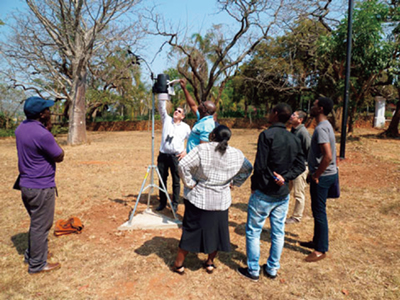(10) STI for SDGs
In the world today, progress in science and technology, as represented by artificial intelligence (AI) and robotics, leads to social changes and underpins economic growth, through utilization of information technology (IT) and information and communication technology (ICT) in diverse industries, including not only the manufacturing industry and the service industry but also agriculture and construction. Utilizing STI and adapting it for social changes is a common theme for not only developed countries but also developing countries. In addition to discussions in various countries, attention to this theme is also being paid at multilateral forums such as the G7, G20, and OECD.
In the 2030 Agenda for Sustainable Development (Paragraph 70), the United Nations promotes STI for SDGs on a global scale, with cooperation by various countries by establishing the United Nations Inter-agency Task Team (UN-IATT) within the Technology Facilitation Mechanism (TFM) created based on a multi-stakeholder collaboration between United Nations member states, civil society, the private sector, the scientific community, United Nations entities, and other stakeholders. In addition, as an initiative of TFM, the United Nations Multi-Stakeholder Forum on Science, Technology and Innovation for the Sustainable Development Goals (STI Forum) has been held annually since 2016. Furthermore, the Political Declaration of the SDG Summit adopted in September 2019 mentions the commitment to harnessing STI with a greater focus on digital transformation for sustainable development. As can be seen from these efforts, there are increasing international expectations for STI as a key to contribute to realizing the SDGs by fully utilizing limited resources.
●Japan’s Efforts

Inspecting the automatic weather observation equipment installed through the “Project for Establishment of an Early-warning System for Infectious Diseases” in South Africa (Photo: JICA)
In the process of its economic development thus far, Japan has the experience of overcoming its own issues in fields such as health and medical care, environment, and disaster risk reduction while fully utilizing STI. Based on these experiences, in recent years Japan has been engaging in cooperation related to science and technology to resolve issues faced by developing countries through the Science and Technology Research Partnership for Sustainable Development (SATREPS) and other such initiatives (see “Glossary” for details on SATREPS). Some good practices of problem-solving initiatives by SATREPS include the development of climate change predictions and an early warning system on infectious diseases in South Africa, and the establishment of a system for resolving and adapting to water-related disasters in Thailand (see “Master Techniques from Japan to the World” for details on specific initiatives by SATREPS).
In December 2015, as a part of the Science and Technology Diplomacy Advisory Network utilized in the process of planning and formulating various diplomatic policies including Japan’s diplomacy and international conferences, the Advisory Board for the Promotion of Science and Technology Diplomacy was established and composed of academic experts in fields related to science and technology diplomacy. In May 2017, the Advisory Board released the Recommendation for the Future (STI as a Bridging Force to Provide Solutions for Global Issues), a recommendation regarding specific science and technology diplomacy initiatives toward implementing the SDGs, including promotion of cooperation among different sectors such as private companies and civil society as well as human resources development in the area of science and technology. In addition, in May 2018, the Advisory Board presented the Recommendation on Science, Technology and Innovation to Achieve the SDGs and its Guiding Tool, the STI Roadmap.
Based on these two recommendations, at the G20 Osaka Summit in 2019, the importance of STI was recognized, as well as the need for effective participation by various stakeholders, including governments, academia, research institutions, civil society, the private sector, and international organizations in harnessing the potential of STI. As a result, the Guiding Principles for the Development of Science, Technology, and Innovation for SDGs Roadmaps, formulated by the G20 Development Working Group, were endorsed as an Annex of the G20 Osaka Leaders’ Declaration.
Alongside this, in order to encourage countries around the world to consider formulating roadmaps, the UN-IATT began an initiative known as the Global Pilot Programme and chose five countries – Ethiopia, Ghana, Kenya, India, and Serbia – to be the first pilot countries. In order to support these five countries, in cooperation with the European Union (EU) and international organizations, Japan has begun consideration on assisting particularly Kenya and India in formulating and implementing roadmaps.
In addition, at TICAD7, based on the content of the Recommendations towards TICAD7: Achieving an Innovation Ecosystem together with Africa, submitted by the Advisory Board for the Promotion of Science and Technology Diplomacy, Japan contributed to discussions for promoting practical implementation of the results of international joint research and R&D with cooperation of international organizations toward STI for SDGs. Moreover, the Yokohama Declaration 2019, adopted as the outcome document of TICAD7, also recognizes the important role of STI.
Furthermore, taking the opportunity of TICAD7, the SDGs Solution Hub (https://sdgs-solution-hub.go.jp/) was launched as a website to introduce Japan’s advanced science and technology that can contribute to helping developing countries, including African countries, achieve the SDGs, as well as its good practices. The Government of Japan will continue to enrich the site’s content, and strive to establish the STI for SDGs Platform, a framework that includes schemes for compiling local issues in developing countries and support for resolving them with technology.
Japan will continue to make use of the high potential of STI and actively participate in initiatives of the international community toward resolving the extensive global issues raised by the SDGs, including climate change, changes in marine environments, reduction of biodiversity, issues with food and water resources, infectious diseases, and disasters.
